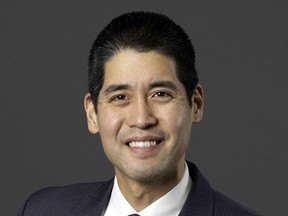“When public health loses its footing it is very difficult to bring it back online.”

The COVID-19 pandemic has underscored what public health can do to improve health outcomes and health equity in communities when it is well-funded, the former medical officer of health for Peel Region told a panel discussion Friday.
Not only did public health units play a leading role in vaccination and COVID-19 mitigation efforts in Ontario, he said, but their work also improved vaccine uptake and health outcomes in the most vulnerable communities.
Sign up to receive daily headline news from Ottawa Citizen, a division of Postmedia Network Inc.
Thanks for signing up!
A welcome email is on its way. If you don't see it, please check your junk folder.
The next issue of Ottawa Citizen Headline News will soon be in your inbox.
Dr. Lawrence Loh said the health system depended on well-funded and independent public health to keep communities healthy, and public health should remain separate from the acute care system.
Loh, who is currently executive director and chief executive officer of the College of Family Physicians of Canada, made the comments during a panel discussion hosted by Algonquin College as part of a series on the future of health and wellness. Ottawa’s Medical Officer of Health, Dr. Vera Etches, and Dr. Gaynor Watson-Creed, former medical officer of health for Halifax and now assistant dean for serving and engaging society for Dalhousie University’s faculty of medicine, were the other panelists.
His and other comments reflect some uncertainty about the future of public health in Ontario at a time when the province’s health system is in crisis. Pressure to fund public health often fades as a political priority when high-profile crises, such as the COVID-19 pandemic, recede.

Before the pandemic, the Ontario government announced a public health modernization plan to reduce the number of health units to 10 from 34 while reducing government funding. Those plans were paused during the pandemic, when the province expanded health units with money to support COVID-19 vaccination and mitigation efforts. It is not clear whether those plans, or some form of them, remain under consideration.
Watson-Creed warned that provinces might not feel the same imperative to prioritize public health because the Canada Health Act “doesn’t directly speak to public health the way it speaks to acute care.” She called for public health to be included in federal-provincial health funding frameworks.
Loh said public health units at the municipal level understood population needs and could enact changes from the ground up.
Etches noted that local public health and municipalities had traditionally helped drive provincial policy by being first to enact local smoking bylaws, for example.
She said work begun by Ottawa Public Health during the pandemic focusing on the fact that some neighbourhoods had poorer health outcomes than others would continue beyond COVID-19. Meanwhile, she said OPH was trying to catch up on routine vaccinations and to expand work on mental supports, among other things.
Watson-Creed warned that provincial “tinkering” with public health structure could have devastating impacts. She urged provinces with strong public health systems, including Ontario, to ensure they remained stable.
“When public health loses its footing it is very difficult to bring it back online.”


